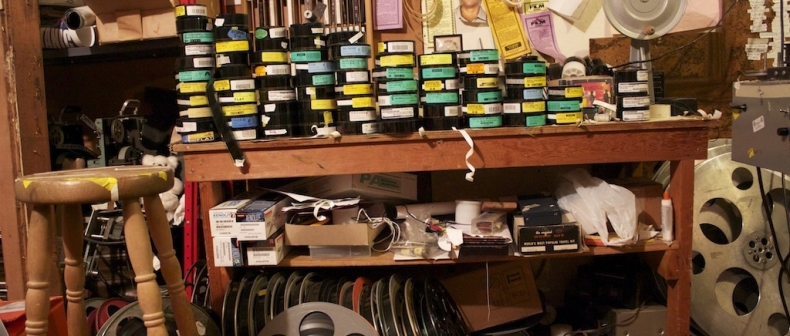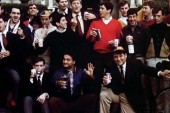
I first heard about the Toronto Underground Cinema as a student at the University of Toronto. One of the managers was Alex Woodside, who I had met as a member of U of T’s Cinema Studies Student Union, a student group that programs free film screenings on campus. The news that Alex, along with his partners Nigel Agnew and Charlie Lawton, were running their own theatre created an atmosphere of excitement among our little crowd of moviegoers. Sure, there were other rep houses in the city, like the Bloor and the Royal, but the Underground different. After all, it was run by three film lovers who, as far as I could tell, were just like me.
Unfortunately, the guys opened their doors under uniquely auspicious circumstances. Although the Underground received a warm welcome from the Toronto film community, the grand opening of the TIFF Bell Lightbox came quickly on the heels of their own premiere in the summer of 2010. Furthermore, their cinema lacked street presence; it was located at the back of a Chinatown condo building. It didn’t help that distributors were swiftly moving to digital projection, a technological upgrade the struggling theatre could not afford to install.
Last fall, the Toronto Underground Cinema closed its doors after the pressure to turn a profit became overwhelming. Prior to the closure, the Underground served as a favourite event space for cultural groups and film festivals alike, as well as a favourite hangout spot for local film dweebs hoping to catch a screening of Lady Terminator or Big Trouble in Little China. Morgan White, a local filmmaker, documented the struggles of Alex, Nigel, and Charlie, initially for a web series titled The Rep, and later as a documentary by the same name. That film will have its Toronto premiere tonight at another repertory cinema, The Revue. I recently had a chance to meet Morgan and Alex and to discuss The Rep, the Underground, and the difficulties of running an independent cinema in a constantly changing economy.
(Note: These guys were passionate and enthusiastic and we ended up chatting for over an hour, so the conversation that follows has been edited and condensed a fair bit.)
Alan: First, I want to know how you guys met, what the genesis of this project was and how it progressed from a web series to the feature-length documentary that we’re watching now.
Morgan: Well, basically, the way the whole thing started when I was at a screening at the Bloor [Cinema] with some friends, and I saw Alex, who I didn’t know at the time, barreling down the aisle with a microphone in hand and he was all flustered. I turned to my friends and I said “that’s kind of interesting. I wonder what’s going on?” Then I started thinking about it, and I said to him “Maybe there’s a story here of what happens behind the scenes of a movie theatre.” Because we all go to movie theatres, but we don’t really pay attention to what’s going on.
Alex: We just did the grand opening of the Underground. It was a week after that, but a week before we opened for regular shows that [Morgan] came in and wanted to do a web series, and we were all down with that. We shot a whole bunch of episodes. How many episodes was it?
Morgan: There’s five of them. I initially had the idea that I would go a couple of days after work and hang out with them and film and see what happens, and then I just started hanging out there pretty much every day. And the story progressed and it got more deep and intense and emotional and they opened up a lot more over time because I was there and they got used to me being there and having the camera on. I suddenly realized there’s a lot more here, there’s a way bigger story, and a much more interesting story than I could ever tell in a web series.
Alex: He was there shooting like every day for months.
Morgan: There’s a lot of extra footage. By the time the whole thing was done, I think there was about 350 hours. Somewhere in that vicinity of footage. It’s a lot.
Alan: When I watched the movie, it’s very open about the relationships between the three main characters and the emotional stakes that come with it. Was there a conscious decision to give Morgan that sort of access?
Alex: I guess so. It’s hard to say it was a conscious decision, because we were really comfortable with Morgan, and I guess we trusted him early on to deal with who we are as people and respect that with whatever he was going to do in the end. So there was never a point where I was overly concerned. He was always there, so the fact that he was filming didn’t register after a while. Especially because the early part of getting to know Morgan was caught up with just doing the web series, which was more specific, so when he expanded it out, we already had that level of comfort, and we had already seen what he had cut together for the web show. So I don’t think we had that level of fear where it was like “Who knows what this fucking guy’s going to come up with.”
Alan: When did you decide to expand beyond the Underground and also profile other rep houses across North America?
Morgan: That was actually a conversation I had with Alex. He asked me “What’s going on at the Drafthouse? Or what’s going at the New Beverly?” Because these are all cinemas that we know about and we talk about. I had this thesis that I had built around what we were doing with the Underground, saying “It’s really hard to run a repertory cinema, or run an independent theatre of any type.” But the viewpoint that I had was only at the Underground and the question was “What is it like in other places?”
Alex: In Canada, we always assume that things are always very similar to what’s going on in the US because we’re so close, but it’s not always the case. When I was trying to get prints, I would have a really really hard time trying to get a print, because I would have to get a Canadian print that was owned by the Canadian wing of Warner Brothers or whatever, and getting anything from the US was a major pain in the ass and if I wanted to ship it [across the border] it was really expensive, whereas Americans don’t have to deal with that. So they have more access to a lot more stuff, and I think that’s a large part of where the conversation started is “What is different for them? Is it hard for them as well? Are they having an easier time? What’s going on?”
Morgan: I think people were kind of astonished that there was somebody that wanted to make a film about this. So much so that when I was in New York at the Film Forum, the first thing that Bruce Goldstein said to me, and Bruce is like the king of repertory cinema, it’s his life, it’s all he’s ever done. He said “Do you think that anyone even cares about this? Why are you making a film about this? Is anyone going to watch it?” And I said “Well, I hope so or I’m wasting my time, but let’s just roll with it and see what happens.” It was really cool to go to all of these different cinemas and talk to them. To go to someplace like the New Beverly, which is owned by Quentin Tarantino. It’s in LA, which is the movie capital of the world, where they have access to prints that no one else has access to and all that kind of stuff. To hear the owner say things like “Well, I’ll put up a movie and four people will come.” To hear him say that about a theatre that’s in LA, owned by Quentin Tarantino. It’s very telling that it’s a global problem, so my thesis about the Underground is real for everyone else.
Alan: From your experiences, Alex, what do you think the secret is to find some sort of economic success at an independent cinema?
Alex: It’s hard to speak for the other markets, but Toronto’s a really hard market because it’s been so compartmentalized, especially in the downtown. Now that Hot Docs is at the Bloor, and they specifically play documentaries, and TIFF has their facility and they play a lot of really independent movies, it’s kind of really separated the landscape out. Depending on film is really no longer an option for the single screen movie theatre, you have to branch out. That’s what we were doing towards the end when we were doing a lot of comedy events, a lot of burlesque events, a lot of live stuff. There really is no room for someone who just wants to play film anymore, who wants to make a business of that.
Alan: This film is pretty candid about how you guys were a little naïve going into this experience. Is there anything that you would change if you went back?
Alex: I think our biggest mistake, hands down, is that we opened too soon. When we walked in there, it was basically four weeks from the day we signed our contract to the day we had our opening event, and that just wasn’t enough time to realistically make it work, so if I could do anything different, I would make it like three months. If we had three months and could have really thought it out, I feel like we could have done a better job, but it felt like we were under the gun right away.
Morgan: I think, to some extent, that naïve willingness to make it work was kind of the beauty of the place, too, and I always loved that. Things didn’t always work out, but there was always that sense of “Well, it didn’t work out, but maybe it will next time,” and that was always a thing that kept them going through all the shit… for a while. Obviously, they got beaten down in the end, anyway, but I always liked that idea that “We might not know exactly what we’re doing or we might not be doing this the right way, but fuck it, we’re just going to do it,”
Alex: We felt like we could do it, and when we announced the screening, it blew up like right away and everyone was talking about, and the traffic on Facebook exploded. When we started our Facebook thing and we told people we were opening, our plan was to work to a thousand followers by the time we opened and in the first two days we had four thousand. So I think that kind of immediate response from the city made us feel like “Oh, this is going to work,” and then the regular screenings started and it was like “Oh no. It’s not all going to be like that.” It was a pretty rude awakening.
Alan: Regarding Facebook and the level of support that you had at first. You had a huge following on Facebook, but when it came to actually showing up and supporting the theatre, it didn’t happen. Why not?
Morgan: Most people would prefer to sit at home and watch a DVD that they have on their shelves than go out and be a part of a community, which is what a repertory cinema or an independent cinema is. It’s really just a community that happens to show movies. I think the fact that a lot of people were responsive to it initially on Facebook and then the lack of them coming was just an example of the way society has changed drastically in the last ten years. Originally what affected independent cinemas or repertory cinemas was the home video boom. Now it’s peoples’ inability to choose between the various forms of entertainment and also to decide whether they really want to be a part of the social experience, because most people just don’t.
Alex: When the Underground was packed, we were able to deliver such an amazing atmosphere and that atmosphere totally came as a result of the amount of people who were there. But it became this Catch-22, because if the event wasn’t a really big event that people knew was going to be really busy, then people shied away from coming because sitting in that space with 10 other people is not amazing. It’s a bit of a weird feeling.
Alan: I do think people enjoy it when they do get that kind of perfect moviegoing experience.
Alex: I think people totally enjoy it. You go to opening weekend for any single fucking movie, it doesn’t matter what the movie is…
Morgan: But then there’s some asshole that pulls out their phone and ruins it for you.
Alex: If you go see the new Transformers movie at the Scotiabank Theatre, I think you’re going to have to expect a certain level of distraction. And if you don’t want to deal with it, then you have two options. Either you don’t go, which is what people are doing now, which kinda sucks, or you fucking say something. There’s nothing wrong with being all like “Excuse me, can you turn your phone off,” and if they say no, there’s nothing wrong with telling them to go fuck themselves because they’re being an asshole. You can do that! One of the number one uses of popcorn is not food, it’s to throw at people. I think people should throw their popcorn at people who have their phones on. I think that should be a thing. That was one of the last things I really wanted to do at the Underground was to print up a big fucking sign that had someone sitting with a phone on with a light in their face and someone behind them throwing popcorn at them and it would say “This is how you deal with the situation.”
Alan: Let’s go back to the future of 35mm film projection. Obviously, most theatres have moved to digital projection and film is for a niche audience now, but what do you think is the future for that niche format?
Morgan: 35mm will survive as long as people are willing to keep it alive. There’s no time stamp on when it’s going to die. It’s just whether someone wants to keep it alive. There are theatres like the Drafthouse and the New Beverly, which exclusively play everything on 35, and that’s because Tarantino strikes new prints for them sometimes. But there has to be people like that. There has to be people ballsy enough to say “No, I want to keep this alive,” and I think that is going to happen and that is happening and that will continue happening.
Alex: If Hollywood hadn’t decided that 3D was going to be a thing, people could care less. It’s coming from the industry. The amount of money that distributors are saving on digital distribution as opposed to film distribution is a billion dollars [per year].
Morgan: That’s how much it costs to strike and distribute prints on 35mm, a billion dollars. Now they can send everything out on a $100 hard drive.
Alex: That’s why tickets are $20 now. It’s not really the distributor that wants to charge you $3 extra for your 3D glasses. It’s the exhibitor, because he needs to pay for the million dollar per facility investment that they’ve put into these new machines. When you look at it on a single screen scale–an operator that has one movie house, one screen, 300 seats, one snack bar with two tills–being able to afford a $150,000 renovation is almost impossible, because they’re working on a model where they’re barely making any money in the first place. That’s the real issue to me for digital. When things are already as tough as fucking shit for the independent movie theatre to exist, now, in order to play movies, they have to upgrade.
Alan: All right, one last question, Alex. If you had the chance to do it all over again, would you.
Alex: Yes.
Morgan: I find it interesting that still is your answer.
Alex: I’ve had my doubts. Knowing what I know now going into it, yeah I’d still do it. I’d do things differently, but I would still do it. Even if the end result would be the same, I’d still do it. It was a great experience and I’m happy that I did it, and I have no serious regrets about it. There’s specific regrets about specific things, but overall, I definitely don’t regret it. I’m very proud of what we did there.
The Rep will be premiering at The Revue Cinema tonight at 7:00 pm. It will play again at the Revue tomorrow at 9:30 pm before moving to Big Picture Cinema for a weeklong run.
____
Alan Jones writes about film for Toronto Standard. You can follow him on Twitter at @alanjonesxxxv.
For more, follow us on Twitter @TorontoStandard and subscribe to our newsletter.














